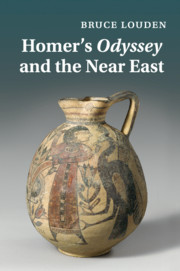Book contents
- Frontmatter
- Contents
- Acknowledgements
- Introduction
- 1 Divine councils and apocalyptic myth
- 2 Theoxeny
- 3 Romance
- 4 Odyssey 4
- 5 Odyssey 5
- 6 Odyssey 6–8, 10–12, 13.1–187; Genesis 28–33; Argonautic myth
- 7 Odysseus and Jonah
- 8 The combat myth
- 9 Catabasis, consultation, and the vision
- 10 Thrinakia and Exodus 32: Odysseus and Moses
- 11 The suitors and the depiction of impious men in wisdom literature
- 12 Odysseus and Jesus
- 13 Contained apocalypse
- Conclusion
- Bibliography
- Index locorum
- Subject index
5 - Odyssey 5
Ogygia and creation myth; Kalypso and Ishtar
Published online by Cambridge University Press: 04 February 2011
- Frontmatter
- Contents
- Acknowledgements
- Introduction
- 1 Divine councils and apocalyptic myth
- 2 Theoxeny
- 3 Romance
- 4 Odyssey 4
- 5 Odyssey 5
- 6 Odyssey 6–8, 10–12, 13.1–187; Genesis 28–33; Argonautic myth
- 7 Odysseus and Jonah
- 8 The combat myth
- 9 Catabasis, consultation, and the vision
- 10 Thrinakia and Exodus 32: Odysseus and Moses
- 11 The suitors and the depiction of impious men in wisdom literature
- 12 Odysseus and Jesus
- 13 Contained apocalypse
- Conclusion
- Bibliography
- Index locorum
- Subject index
Summary
When the Odyssey brings Odysseus onstage after a four-book focus on Telemachos, he has no connection to the circumstances with which the poem has so far been concerned (the crisis the suitors cause in Ithaka for Telemachos and Penelope). He is off the map, as far as normal human existence is concerned. To insert Odysseus into its plot the Odyssey draws on three overlapping genres of myth. In placing Odysseus in a paradise where he could remain forever and be immortal, the Odyssey employs key motifs from creation myth. In his relationship with Kalypso, the Odyssey draws upon the mythic genre of the hero's involvement with a goddess who offers to make him her consort, as Gilgamesh depicts in his encounter with Ishtar. But Book 5 combines these two types with a third genre of myth, a hero's blessed afterlife in a paradise set at the ends of earth, to which the Odyssey briefly alludes in Menelaus' encounter with Proteus (Od. 4.561–9). All three genres focus on the possibility of the hero becoming immortal. The first and third types overlap in their paradise setting, which by definition is cut off from usual mortal existence.
KALYPSO AND OGYGIA, PARADISE AND CREATION MYTH
Since epic can incorporate any kind of myth, it is not surprising that the Odyssey draws on creation myth for several elements of Book 5. In the Deception of Zeus, Book 14 of the Iliad also incorporates elements of creation myth, as several commentators have shown.
- Type
- Chapter
- Information
- Homer's Odyssey and the Near East , pp. 124 - 134Publisher: Cambridge University PressPrint publication year: 2011



